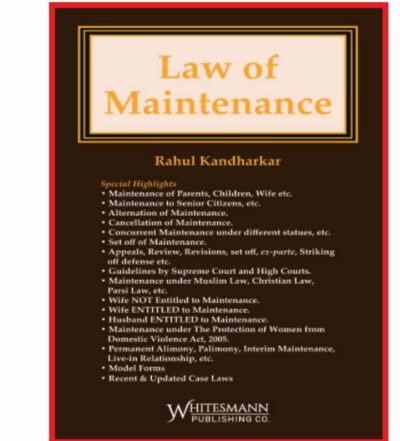Bharatiya Nyaya Sanhita a Departure from the colonial Era
Original price was: ₹750.₹675Current price is: ₹675.
Description
“Bharatiya Nyaya Sanhita: A Departure from the Colonial Era” – this topic invites an analysis of how the Bharatiya Nyaya Sanhita, 2023 (BNS), which replaces the colonial-era Indian Penal Code, 1860 (IPC), marks a shift in India’s approach to criminal justice.
—
✅ Introduction
The Bharatiya Nyaya Sanhita, 2023 replaces the Indian Penal Code, 1860, which was drafted by Lord Macaulay during British colonial rule. This legislative shift is symbolic of India’s effort to decolonize its criminal justice system and reflect the values of a sovereign, democratic republic. The BNS aims to create a more just, efficient, and citizen-centric legal framework.
—
🔍 Key Departures from the Colonial Legacy
1. Victim-Centric Approach
Colonial Era (IPC): Focused heavily on protecting state power and maintaining colonial order.
BNS 2023: Emphasizes justice for victims, faster trials, and use of technology (e.g., mandatory forensic investigation in heinous crimes).
2. Modernization of Offences
New offences like mob lynching, organized crime, and terrorism are included.
Sedition (Section 124A of IPC) has been repealed and replaced with a more narrowly defined offence related to acts endangering the sovereignty and unity of India (Section 150 of BNS).
3. Simplification and Indianization
Use of simpler, more accessible language.
Replaces British legal jargon with terms relatable to Indian context (e.g., “offence” instead of “felony/misdemeanor”).
4. Time-Bound Justice
Provision for framing charges within 60 days of first hearing.
Judgment delivery mandated within 45 days after the conclusion of the trial.
5. Enhanced Use of Technology
Encourages e-FIR, video trials, digital documentation, and electronic communication of summons—addressing delays and accessibility.
6. Community and Restorative Justice
Promotes compounding of offences, plea bargaining, and community service as alternatives to imprisonment in minor offences—shifting from a purely punitive model.
—
⚖️ Critical Analysis
Progressive Shift: BNS reflects India’s aspiration to move away from colonial repression towards a more republic-centric justice system.
Challenges Remain: Some critics argue that certain provisions, like the new sedition-like clause, may still be prone to misuse.
Implementation Hurdles: Transitioning to BNS requires capacity-building among police, judiciary, and legal professionals.
—
📜 Conclusion
The Bharatiya Nyaya Sanhita, 2023 represents a paradigm shift from the British-imposed penal system to a home-grown, citizen-focused code. It is a significant step in India’s journey to decolonize its legal system and align its criminal laws with the values of constitutional morality, human dignity, and justice.
—
Additional information
| Binding | Hardbound |
|---|---|
| Language | English |
| Publisher | Whitesmann Publishing |
You must be logged in to post a review.










Reviews
There are no reviews yet.